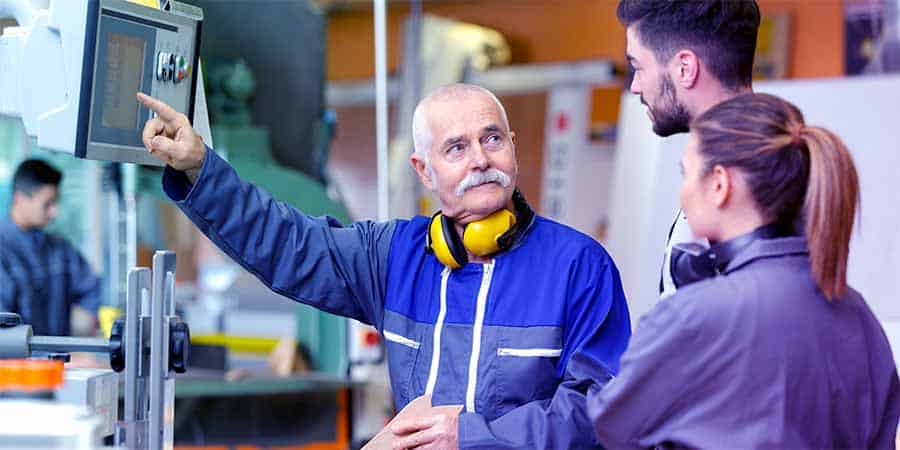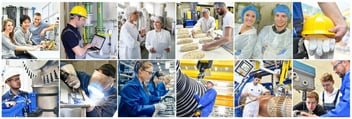In the rapidly evolving world of manufacturing, one challenge remains constant: the skills gap. As technology advances and the nature of work changes, the demand for skilled workers in manufacturing continues to grow.
However, the supply of these workers is not keeping pace, leading to a significant skills gap in the industry. This article explores how apprenticeships can play a crucial role in addressing this issue, drawing on insights from industry leaders and recent developments in the field.
The Skills Gap in Manufacturing: A Growing Concern
According to Meghan West (see the video below), the President & CEO of Mastercam, there are currently around 720,000 open manufacturing jobs, and this number is expected to rise to 2.1 million by 2030.
This labor gap could lead to a loss of about a trillion dollars in economic output. The recently signed infrastructure bill in the U.S., while promising, lacks the workforce to execute its ideas, as $100 billion that was supposed to be allocated for workforce development was removed.
…apprentices could help boost staffing levels in areas where it is traditionally harder to recruit.
The situation is similar in the UK, where Health Secretary Steve Barclay suggests that nurse and doctor apprentices could help boost staffing levels in areas where it is traditionally harder to recruit health workers.
While this is specific to the health sector, the principle applies to manufacturing as well. Areas that find it difficult to recruit could benefit from local apprenticeships, growing their own skilled workforce from within the community.
The Power of Apprenticeships
Apprenticeships offer a unique solution to the skills gap problem. They provide on-the-job training for specific fields, allowing apprentices to learn a trade while earning an income. This approach has several key benefits:
- Learning from Experienced Professionals: Apprentices have the opportunity to learn from seasoned professionals in the industry, gaining insights that can be difficult to acquire in a classroom setting.
- Receiving Hands-On Training: Apprentices receive hands-on training, which is particularly beneficial for individuals who learn best by doing.
- Gaining Real Work Experience:
Apprenticeships provide firsthand experience of what it’s like to work in a manufacturing facility, helping apprentices to build comfort and confidence in their roles. - Increasing Earning Potential:
As apprentices build experience and skills, they can enhance their resumes, which can lead to higher pay rates in the future. - Getting Paid to Learn:
One of the most appealing aspects of an apprenticeship is the ability to earn while learning, which can provide work/life balance and a consistent paycheck.
Apprenticeships in Action:
Case Studies
In the manufacturing sector, companies like Mastercam are partnering with organizations like Workshops for Warriors to train veterans re-entering civilian life. This not only provides valuable skills to the veterans but also supplies the manufacturing industry with the skilled workers it needs.
Meghan West, the President & CEO of Mastercam – interviewed by Jill Malandrino, a global markets reporter at Nasdaq.
In the UK, the Elite Centre for Manufacturing Skills (ECMS) is a new £12m employer-led training facility designed to enhance productivity in the region’s high-value manufacturing sector. The center aims to train 450 apprentices over the next five years and provide specialist training to upskill the current and future workforce, helping to close skills gaps identified by employers.
The Future of Apprenticeships in Manufacturing
As the skills gap in manufacturing continues to widen, the importance of apprenticeships cannot be overstated. They offer a practical, effective solution to a complex problem, providing individuals with the skills they need to succeed in the industry while helping manufacturers build a skilled, reliable workforce.
…this includes increasing funding for apprenticeship programs.
However, for apprenticeships to reach their full potential, they must be recognized and supported by industry leaders, policymakers, and educational institutions. This includes increasing funding for apprenticeship programs, promoting the benefits of apprenticeships to students and job seekers, and working with manufacturers to develop apprenticeship programs thatmeet the needs of the industry.
In addition, apprenticeships should be designed to be flexible and adaptable, reflecting the changing nature of the manufacturing industry. This means incorporating training in emerging technologies, such as AI and robotics, and providing ongoing learning opportunities to help apprentices keep their skills up to date.
Key Takeaways
- The skills gap in manufacturing is a significant challenge, with hundreds of thousands of jobs currently unfilled.
- Apprenticeships offer a practical, effective solution to this problem, providing on-the-job training and real work experience.
- Case studies from companies like Mastercam and institutions like the ECMS show the positive impact of apprenticeships in action.
- For apprenticeships to reach their full potential, they must be recognized and supported by industry leaders, policymakers, and educational institutions.
- By embracing apprenticeships, we can create a future of work in manufacturing that is skilled, diverse, and resilient.
The skills gap in manufacturing is a significant challenge, but it’s not insurmountable. By leveraging the power of apprenticeships, we can equip individuals with the skills they need to succeed in the industry, while helping manufacturers build a skilled, reliable workforce. This not only benefits the individuals and companies involved but also strengthens the manufacturing industry as a whole, contributing to economic growth and innovation.
Nvolve: Your Partner in Bridging the Skills Gap
As we navigate the complexities of the skills gap in manufacturing, it’s crucial to have the right tools and resources at our disposal. That’s where Nvolve comes in. Our Learning and Development Module, featuring the innovative Skills Gap Analysis dashboard, is designed to help you future-proof your business and unlock the full potential of your workforce.





